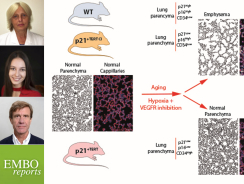Larissa LIPSKAIA, Juliette JACQUET and Serge ADNOT, DERUMEAUX team, co-authors of a publication in EMBO Reports on the role of telomere dysfunction and endothelial cell senescence in age-related deterioration in lung function.
 In association with the Institute for Lung Health, Justus Liebig University, Giessen, Germany, and scientists from Inserm, CNRS and Aix-Marseille University, Larissa Lipskaia, Juliette Jacquet and Serge Adnot, co-corresponding author, from the DERUMEAUX team, have just published a study showing that in the experimentally-induced emphysema model, as occurs during natural ageing, mTert expressed under the control of the p21 promoter protects the lungs against the loss of capillaries and the development of pulmonary emphysema, mainly by counteracting the senescence of endothelial cells.
In association with the Institute for Lung Health, Justus Liebig University, Giessen, Germany, and scientists from Inserm, CNRS and Aix-Marseille University, Larissa Lipskaia, Juliette Jacquet and Serge Adnot, co-corresponding author, from the DERUMEAUX team, have just published a study showing that in the experimentally-induced emphysema model, as occurs during natural ageing, mTert expressed under the control of the p21 promoter protects the lungs against the loss of capillaries and the development of pulmonary emphysema, mainly by counteracting the senescence of endothelial cells.
Age-related decline in lung function is a paradigm of the degenerative process induced by telomere dysfunction, characterised by activation of p21 and p16 and cellular senescence. This study presents mouse models that express the telomerase catalytic subunit (mTert) under the control of the p21 promoter.
The researchers found that p21 promoter-dependent expression of mTert prevents emphysema in aged mice, coinciding with maintenance of microvascular density, reduced endothelial cell senescence and preservation of a pool of CD34+ endothelial cells with proliferative capacity (endothelial progenitor cells).
In addition, p21 promoter-dependent mTert expression also protects the lungs of young mice from endothelial cell senescence and severe emphysema induced by VEGF receptor blockade combined with hypoxia.
Overall, these results open up new avenues for the development of treatments based on conditional expression of mTert targeting endothelial progenitor cells to cure lung diseases.
This study can be found in the journal EMBO Reports on 29 February 2024.

